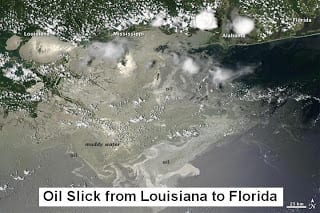
By Michael Beck
Consumerism. We cannot escape the word’s origin in the Latin consumere, to devour. Nor should we ignore that before conspicuous consumption morphed into the highest form of the American Dream, ‘consumption’ meant incurable tuberculosis, devouring the breath of life.
Now, in its modern meaning it’s consuming the breath of life of the planet itself. The oceans, along with the tropical rainforests, serve as the Earth’s lungs, absorbing C02 and emitting oxygen, but now they face the latest assault on them, courtesy of BP and multinational Big Oil. Admittedly this spill is wreaking havoc only in the Gulf, a small part of the Atlantic basin (600,000 square miles) and, hey, that’s hardly any bigger than the U.S. seaboard from Maine to Florida.
Though just a ‘minor’ chunk of planet, thousands of miles of critically sensitive shoreline are staring at devastation well into the foreseeable future. Moreover, let’s not forget the million-plus barrels marauding across the deep-ocean floor, doing God knows what to a critical habitat we’re only beginning to understand. This lack of knowledge combined with the unprecedented depth of the spill should be, shall we say, sobering.
So, how is society dealing with it? To answer, imagine a continent-scale boxing arena. In one corner we have this hemorrhaging New-Jersey-sized oil slick sloshing sludge around the Gulf with no one knowing who’s going to get smeared next. In the other corner we have Slick Oil defending its turf with a fist as big as billions of PR dollars can make it.
So far Big Oil appears to be winning. Energy reform and regulation have stalled out in Congress while slick commercials saturate the media, warning us that any limits on laissez-faire energy will throw millions out of work and sabotage our standard of living. “STOP the Energy Tax” ads have begun crawling over normally reputable science-news websites, as if cheap carbon were too sacred to tax like most of the other things we consume. How many times have we seen those full-page ads alleging the oil industry’s environmentalism, backed by bucolic landscapes and a strategically-placed leaf or two? At least the leaf is relatively honest, it takes little imagination to perceive what a nice big fig leaf can cover.
So how can we level the playing field? From the outset Postconsumers has implied that we can counter money power with people power. What’s more, this strategy has been pioneered by environmentalists such as the Sierra Club who have repeatedly overwhelmed big-industry megabucks with public outrage. And to my mind, at the heart of postconsumerism there lies an even more fundamental sense of outrage.
Call it ultimate outrage. The basis of consumerism – the drive for the GNP to grow forever lest it collapse – makes it imperative that people become willing to surrender their selfhood, their ancient community core values, and morph from citizens into consumers for the sake of the economy and the American Dream. This model also reshapes the Earth’s living biosphere into a global warehouse of raw materials, inescapably so, since limitless growth demands it. Billions spent to create a world-wide sheen of happy consumers grateful for the cornucopia cannot hide this moral bankruptcy.
At least it cannot be hidden from the postconsumer-minded, for our awareness is the first line of defense against the monolith funded by Big Oil and its bedfellows. Let me put it this way: mindfulness subverts, absolute mindfulness subverts absolutely. I see our movement as a groundswell of awareness (feel free to call it subversion!) spreading from person to person. Whether it be a shopper giving up impulse buying to pay off her credit cards, a parent downsizing to spend more time with his or her children, a Gulf fisherman so sickened he becomes an activist, they are all eating through the wall of propaganda until it eventually crumbles.
I sense a historical inevitability to this, due only in part to Mother Nature’s increasingly loud warnings that we cannot keep messing with the biosphere. I also find a precedent in the collapse of European Communism. In retrospect we can detect the slow decay that operated for decades, so slowly that the Iron Curtain seemed permanent. Yet just as with an exponentially expanding yeast culture, rapid decay only took over in the final year or so, making the collapse of Communism appear virtually instantaneous. Let the proponents of consumerism-without-limit beware!
I foresee that sustainability, as championed by Postconsumers and our many fellow travelers, in the long run will trump Slick Oil.
______________________________





